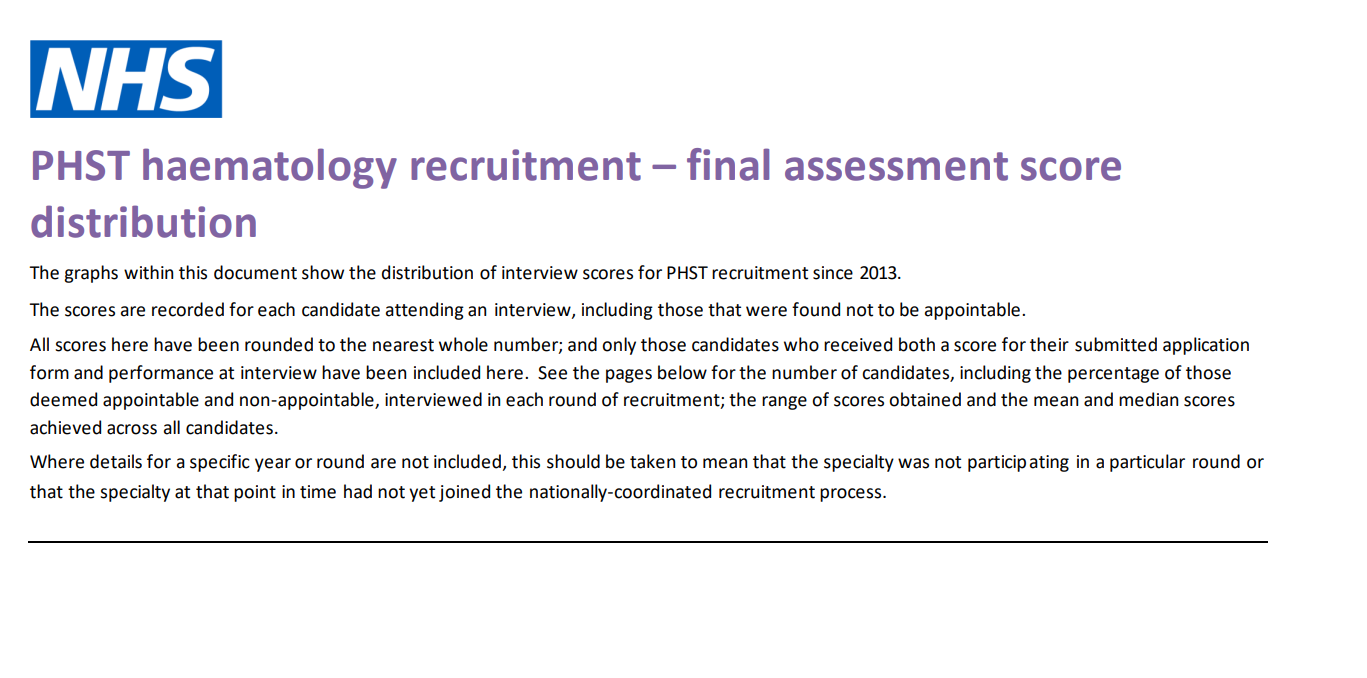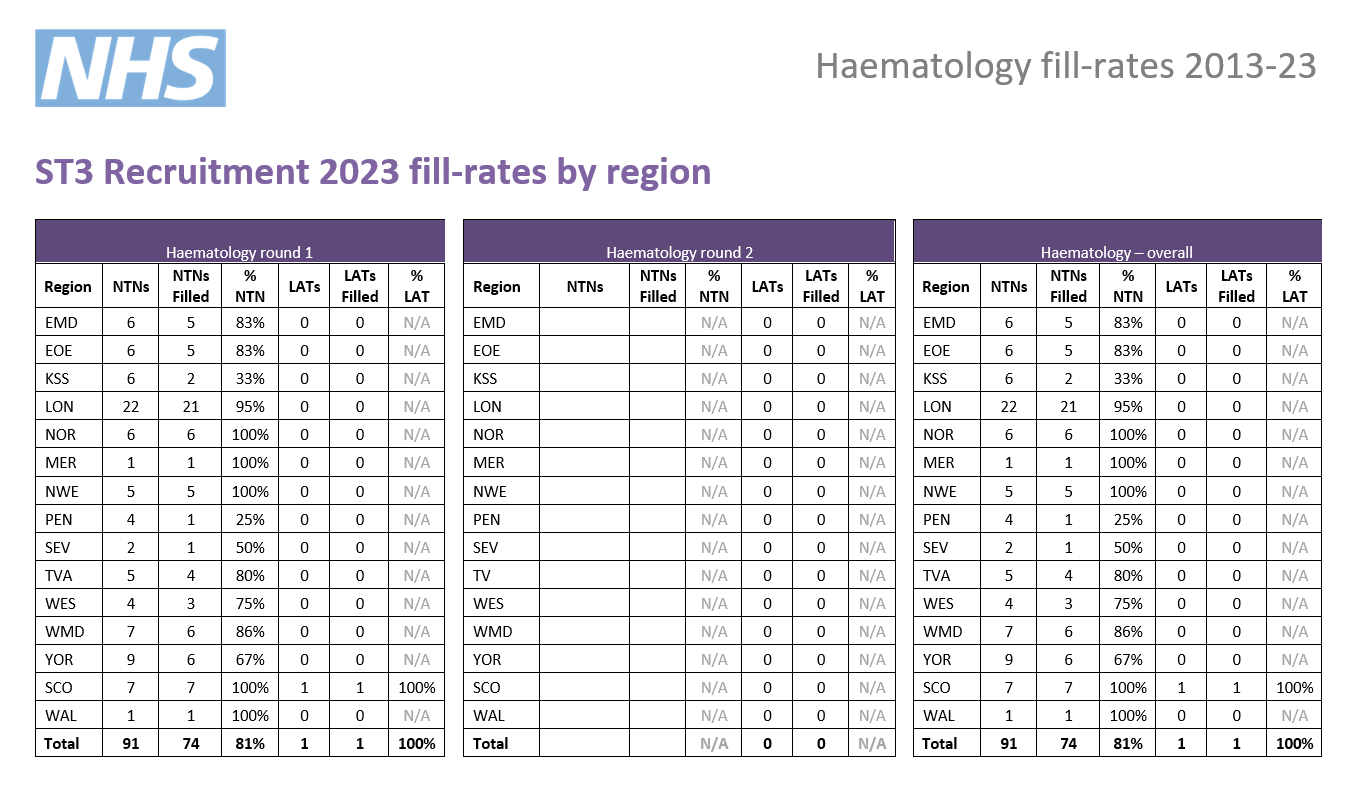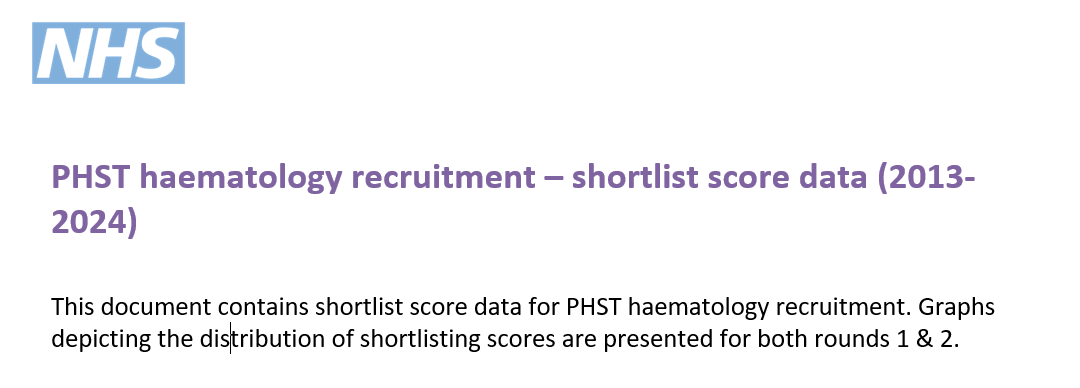Clinical haematology requires both clinical and laboratory expertise.
This dual role provides a unique opportunity to combine clinical skills with appropriate, often cutting-edge science to make a diagnosis; choose the optimal treatment plan; and monitor progress for a range of genetic, malignant and non-malignant disorders.
Haematology - trainee characteristics
Clinical haematology will particularly suit trainees who are:
-
clinically sound
-
eager to apply science to patient care
-
interested in continuing care for chronic disorders
-
keen to provide laboratory support for all areas of medicine.
Working/training in an ST3 haematology post
Specialty training in haematology starts with a clinically-competent generalist MRCP(UK) and develops medical and laboratory skills according to a well-structured curriculum to achieve FRCPath.
Additionally, there are a few training programmes with a paediatric haematology focus. For this reason trainees from a paediatric background are welcome to apply. Please see the 'Planning your application' tab for more information on the eligibility criteria and regions which offer paeditaric haematology training.
In the UK, haematology is an intensive, exciting and rewarding - but demanding - specialty that encompasses both clinical and laboratory practice.
As a result of this dual role, haematologists take an active part in every stage of patient management: from initial clinic visit, to laboratory assessment/diagnosis, and finally to treatment.
Holistic approach
Clinical care is delivered in both in-patient and out-patient environments and the haematologist frequently contributes to diagnosis and management in other specialties and in the intensive care setting.
This holistic approach to clinical care is a highlight of the specialty.
Research/special interests
Haematology is developing rapidly with respect to therapeutic advances, and lends itself to research.
Within haematology there is the opportunity to further develop special interests in a wide variety of clinical and laboratory areas (eg haemogloginopathies, haemostasis and thrombosis, paediatrics, transfusion medicine, malignant haematology, transplantation.)
The specialty may suit a wide variety of individuals including those who may wish to combine a clinical and academic career. The haematology consultant workforce is currently expanding.
Entry into adult haematology specialist training occurs after completion of core training (IMT, ACCS-AM) competences and requires success in the MRCP(UK) or equivalent.
The duration of specialist training is normally five years, to develop the skills for direct patient care and the management of haematology pathology laboratories.
Specialist training provides exposure to all clinical and laboratory areas, including transfusion medicine to enable the trainee to gain all the necessary competences to provide independent patient care and pass the well-established exit examination, the FRCPath.
Further information
General / application queries
For general queries relating to areas such as eligibility criteria, making an application or the Oriel system, please contact the Physician Specialty Recruitment Office.
Queries regarding the progress of a submitted application should be directed to the lead recruiter for this specialty. The lead recruiter for haematology is South West Severn.
| NHS England South West - Severn | ||||||
|---|---|---|---|---|---|---|
| Postal address | Level 1 Park House 1200 Parkway Newbrick Road Bristol Parkway North Stoke Gifford Bristol BS34 8YU |
|||||
| email address | [email protected] | |||||
| website | www.severndeanery.nhs.uk | |||||
Group 2 specialty
This is a Group 2 specialty and requires completion of the first two years of the internal medicine training (IMT) stage 1 programme or equivalent. Please visit the am I eligible? section of this website for further information about the eligibility criteria for Group 2 specialties.
Please be aware that this specialty accepts applicants from paediatrics training routes, in addition to core-level physician training.
Non-physician applicants must have obtained the basic specialty professional examination in addition to specific clinical experience and competences to be eligible.
Please view the specialty's person specification for information about the requirements for applying from a non-physician background and the deadlines for when this must be achieved.
Commitment to specialty
The specialty will be assessing your commitment to specialty as part of the shortlisting process. Please visit the application scoring page for more information about how this is assessed and scored.
Paediatric haematology training
Paediatric haematology training is a part of the haematology specialty training programme. The delivery of paediatric haematology training is currently undergoing some changes. Once information is received, this page will be updated with information about how to access opportunities for paediatric haematology training.
In the interim, you can find out more about paediatric haematology and training through the British Society for Haematology website for the Paediatric Haematology Special Interest Group and its subgroup Paediatric Haematology Trainee Network: https://b-s-h.org.uk/about-us/special-interest-groups/paediatric-sig/
As part of the process of applying to HST, you may wish to gain an idea of how recruitment progressed in previous years for the various specialties participating in the nationally-coordinated recruitment.
To this end, we have published data dating back to 2013 (where this is available), based around four main areas:
-
Competition ratios - application numbers submitted to each specialty, along with the number of NTN and LAT posts available in each. It is worth noting that posts are subject to change throughout the round (increasing on average between 20-40%), and post numbers for this data are taken at the end of the round.
-
Shortlist scores - the scores awarded to all submitted applications, including average scores and distribution nationally.
-
Total scores - the total score awarded to all candidates who completed the full recruitment process for a specialty (application and interview), including some analysis of scores.
-
Post fill rates - the number of posts filled by region.
We have published information for all specialties participating in our process that year; consequently not all specialties will have data in all cases.
Round 1
| Year | Apps. | NTN posts | LAT posts | Total posts | Comp. | Unique* |
|---|---|---|---|---|---|---|
| 2023 | 199 | 91 | 1 | 92 | 2.2 | 61% |
| 2022 | 226 | 74 | 0 | 74 | 3 | 52% |
| 2021 | 231 | 58 | 0 | 58 | 3.9 | N/A** |
| 2020 | 137 | 72 | 1 | 73 | 1.9 | 58% |
| 2019 | 138 | 78 | 3 | 81 | 1.7 | 65% |
| 2018 | 120 | 74 | 1 | 75 | 1.6 | 69% |
| 2017 | 131 | 80 | 0 | 80 | 1.6 | 67% |
| 2016 | 125 | 88 | 1 | 89 | 1.4 | 64% |
| 2015 | 135 | 58 | 12 | 70 | 1.9 | 75% |
* the percentage of unique candidates that only applied to this specialty (out of the PSRO-coordinated specialties)
** As many specialties did not participate in recruitment in 2021, the data is not comparable.
Round 2
| Year | Apps. | NTN posts | LAT posts | Total posts | Comp. |
|---|---|---|---|---|---|
| 2023 | |||||
| 2022 | 101 | 38 | 1 | 39 | 2.6 |
| 2021 | 137 | 24 | 0 | 24 | 5.7 |
| 2020 | 140 | 24 | 0 | 24 | 5.8 |
| 2019 | 53 | 31 | 1 | 32 | 1.6 |
| 2018 | 41 | 33 | 0 | 33 | 1.2 |
| 2017 | 46 | 34 | 0 | 34 | 1.4 |
| 2016 | 22 | 32 | 0 | 32 | 0.7 |
| 2015 | 33 | 26 | 0 | 26 | 1.3 |
Indicative post numbers
Indicative vacancy numbers are available in the table below, broken down by region and divided between substantive national training number (NTN) and locum appointment for training (LAT) posts. In many cases these will be presented as a range (e.g. 1-4) as it is not always possible for regions to know at this stage how many vacancies there will be.
It is the intention that indicative post numbers for all regions will be published prior to the application opening date, although this cannot be guaranteed. Please note that this table is not likely to be updated subsequent to indicative numbers and actual numbers will be confirmed when programme preferences are opened later in the round.
Numbers subject to change
Please be aware that it is not uncommon for vacancy numbers to change as the round progresses.
More commonly, post vacancy numbers can increase as the round goes on (and confirmation of posts becomes available); but it is also possible that numbers can reduce as well. In the past, post numbers have risen an average of 20-40% from the start to the finish of the round but this can vary greatly for individual specialty/region combinations.
It is possible that regions which do not have a post at the start of the round may declare one after applications have closed. Whilst we try and minimise instances of this, it is not always possible to predict vacancies so even if there appears not to be a vacancy in your preferred specialty/region combination, you may wish to consider applying in case one becomes available during the round; you can check with the region concerned if you wish to check on the likelihood of a post arising.
Generally, once a region enter a post into a round they would always have at least one post available and would only withdraw it in exceptional circumstances.
Round 1 Interview dates & posts
| Region |
NTN posts
|
LAT posts*
|
Evidence upload date(s) | Interview date(s) |
|---|---|---|---|---|
| East Midlands | 3 - 10 | N/A |
18/12/23 - 05/01/24 |
11, 12, 13 March 2024 |
| East of England | 3 - 4 | N/A | ||
|
London |
7 - 19 |
N/A | ||
|
Kent, Surrey and Sussex |
0 |
|||
| North East | 0 - 2 | N/A | ||
| North West |
Mersey
0 - 1
|
N/A | ||
| North Western 0 - 1 |
N/A | |||
|
South West |
Severn
0 - 3
Penisula 1 - 4
|
N/A | ||
| Thames Valley | 1 - 3 | N/A | ||
| Wessex | 2 - 4 | N/A | ||
| West Midlands | 1 - 2 | N/A | ||
| Yorkshire & Humber | 3 - 11 | N/A | ||
| Scotland** | 1 - 6 |
TBC
|
||
| Wales | TBC |
TBC
|
*English LATs
Please note, English regions do not recruit to LAT posts.
**Scotland post numbers
If you are interested in working in Scotland, a breakdown of post numbers by the four Scottish regions is available on the Scottish Medical Training website. This has details of all specialty training post numbers in Scotland, including specialties which are not part of the nationally-coordinated process.
The SMT website will always be the more accurate one where they differ.
Interview Content
The interview will be split across two separate stations with a separate pair of interviewers scoring you on the areas within their station. There will be four questions, each 7.5 minutes in length. The headings below show the question areas and in which station they will be covered, along with information about what will be assessed.
Each station will last 15 minutes, so including the time between stations, the interview will be approximately 40 minutes.
Please note that this is subject to change, and will be confirmed by the date of interview.
You will be given a clinical scenario to review, on which you will be asked questions. This will last approximately 7.5 minutes
The scenario will describe a hypothetical clinical situation which has arisen in which you are, or have become, involved. Some points to consider when reviewing the scenario and preparing for discussion are:
- what steps you would take
- any potential treatments possible
- any further information you would gather
- how you would go about communicating with any people (eg patients, family members, colleagues) involved in the scenario.
You should also consider any other factors you deem appropriate, using your experience and professional judgement.
Following the clinical scenario will be discussion of professionalism and governance. This discussion will be prompted by a short question (often a single sentence) provided by interviewers. This will not be given to you before; this will be given verbally by interviewers once the previous question has been completed. The question will last approximately 7.5 minutes.
This section of the interview is designed to assess your demonstration and understanding of professionalism and governance in a given situation.
Familiarise yourself with Good Medical Practice
Please note - assessment of professionalism & governance is underpinned by the principles of GMC Good Medical Practice.
This question will focus on your commitment to training in the specialty and give you opportunity to expand on the information provided in your application form.
This question will last approximately 7.5 minutes.
For this question you will asked to give a presentation, which you are expected to prepare in advance on a given subject.
'An interesting case I have been involved in'
OR:
'An interesting recent development / research finding in haematology'
We stress you should only present on one of these topics, not both. When preparing your presentation, please bear in mind the points below:
- Clarity & relevance most important - Select a topic that is relevant to haematology, and which you can present with clarity. This is more important than trying to impress by choosing a subject that is esoteric or complex. It should be relevant to your application where possible.
- Four-minute time limit - Your presentation must last for no more than four minutes. Bear in mind that interviewers will be assessing the level, depth and content of your presentation, as well as expecting some structure.
-
No aids/resources allowed – you are not allowed to use any visual representations, such as PowerPoint, when giving your presentation and you must not share your screen. You are welcome to use prompts on small cards, but these should be for your own use only.
Post-presentation discussion
Once your presentation is finished (interviewers will stop you at the four minute-mark), interviewers will discuss it with you and ask further questions relating to the items you raise and any further points.
This discussion will take place for approximately another three and a half minutes.
Scoring framework
The score of 1-5 an interviewer will award you for each assessment area is judged in relation to how well you perform against an expected level. Below is the framework used to award scores at interview, as well as interpretation of what these scores represent:
|
Mark
|
Rating
|
Assessment
|
|
1 |
poor |
not considered appointable |
|
2 |
area for concern |
performed below the level expected from a core level trainee applying to the specialty; |
|
3 |
satisfactory |
performed at the level expected of a core level trainee applying to the specialty; |
|
4 |
good |
above average ability; |
|
5 |
excellent |
highly performing trainee; |
As shown in the table, for each of the question areas at interview, 3/5 is considered a satisfactory score; and reflects the level of performance that would be expected of a trainee ready to progress to a specialty training programme.
Should your performance go above and beyond this expected level, interviewers can award marks of 4/5 or 5/5 as appropriate.
Conversely, should your interview performance not reach the expected level, then interviewers can award marks of 1/5 or 2/5, as reflects their level of concern over your performance.
Appointability
Raw interview score (RIS)
The RIS is the sum of all eight scores awarded to you during your interview, but before any weighting is applied.
As each individual score will be between 1 and 5, your RIS will be between 8 and 40.
Appointability requirements
To be classed as 'appointable', you must meet all three criteria below:
- none of your eight interview scores can be 1/5
- no more than two of your eight interview scores can be 2/5
- your RIS must be 24 or above.
If you meet all three requirements, your application will be assessed as appointable, and can progress to be considered for post offers.
However, if you fail to meet any of these requirements, your application must then be assessed as not appointable, and it will progress no further in that round.
Total score
After interview, a weighting is applied to the scores in each area, as well as your application score.
These scores are then combined to give your total score which determines your ranking, which will in turn be used to inform how offers are made. The weighting of different sections, as well as the method by which your total score is established, is detailed in the table accessible through the link below:
|
|
Interviewer 1
|
Interviewer 2
|
Weighting
|
Max score
|
|
Station 1 - Question 1 |
||||
|
Clinical scenario |
/ 5 |
/ 5 |
2.5 |
25 |
|
Station 1 - Question 2 |
||||
|
Professionalism and governance |
/ 5 |
/ 5 |
2.5 |
25 |
|
Station 2 - Question 1 |
||||
|
Suitability and commitment |
/ 5 |
/ 5 |
1.8 |
18 |
|
Station 2 - Question 2 |
|
|||
|
Presentation |
/ 5 |
/ 5 |
1.2 |
12 |
|
Raw interview score |
/ 40 |
|||
|
Interview score (w weighting) |
/ 80 |
|||
|
Application score |
/ 50 |
0.4 |
/ 20 |
|
|
Total score |
/ 100 |
|||




